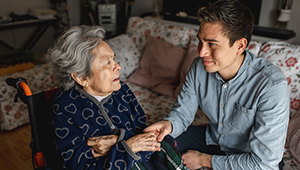Marlaine Figueroa Gray, PhD
Biography
Marlaine Figueroa Gray, PhD, is a medical anthropologist with a passion for eliciting illness narratives and health care experiences from patients, family members, and medical professionals. She has researched how the intersection of creative practices and medical care provide insight into understanding the logic of biomedical care, what counts as evidence that a creative activity "works," and how arts activities can serve as a model of how to provide better, more patient- and family-centered care. She is particularly interested in how we attend to patient suffering, and in what types of care are possible when no medical treatments are available.
Her previous work includes examining education policy in sub-Saharan Africa and developing curricula for health education, specifically HIV/AIDS education in Kenya and Mozambique.
Dr. Figueroa Gray has extensive experience designing qualitative studies and analyzing qualitative data. At Kaiser Permanente Washington Health Research Institute (KPWHRI), she uses this expertise to examine how patients, family members, and physicians make medical decisions when outcomes are uncertain and stakes are high, such as deciding whether or not to participate in an immunotherapy trial, or choosing which treatments to pursue as an adolescent or young adult with advanced cancer. She founded the KPWHRI Qualitative Research Interest Group, which supports outstanding qualitative research at the institute.
RESEARCH INTERESTS AND EXPERIENCE
-
Child & Adolescent Health
-
Social Determinants of Health
-
Complementary & Integrative Health
Implementation of alternative healing programs in U.S. hospitals; patient and provider experience of alternative healing programs
-
Medical Education
Use of the arts in medical education; history of medical education; medical school curriculum development -
Cancer Care and End of Life Care
Oncology support and care; end of life decision making
-
Integrative Medicine and Arts in Healing Programs
Participant experience; benefits; values and funding; legacy projects -
Patient-Centered Care
Shared decision making; care logics
-
Global Health
HIV/AIDS education; maternal and child health; sub-Saharan Africa
Recent publications
Gray M, Lam M. Building bridges through personal exploration and global competency. Paper presented in the Peace Education Special Interest Group at the Comparative and International Education Society, New York. PubMed
Healthy findings blog

Reframing how we speak about dying
In a recently published blog based on her legacy research, Marlaine Figueroa Gray describes how to talk about death.
Research

Supporting young adults through cancer and beyond
A potential new care model for young cancer survivors centers patient needs, support networks.
Healthy findings blog

Creating meaning in health care
Research by Marlaine Figueroa Gray, PhD, includes exploring the intersection of medicine and creativity.



